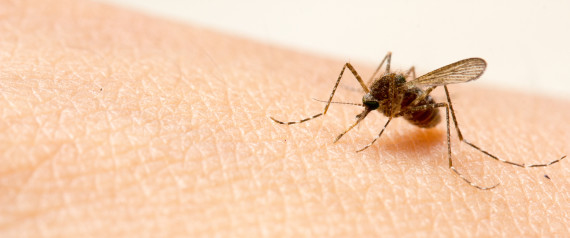
While the exact reasons for why some people are more attractive to mosquitoes than others[1] is still a mystery, scientists do know that mosquitoes are attracted to carbon dioxide that is expelled when we exhale. But if mosquitoes are drawn to our breath, why, then, do they bite areas of exposed skin elsewhere on our bodies?
According to a new study in the journal Cell[2] , the mosquito's receptors that detect carbon dioxide, which are cells called cap neurons, also detect odors emitted from our skin.
"It was a real surprise when we found that the mosquito's CO2 receptor neuron[3] , designated cpA, is an extremely sensitive detector of several skin odorants as well, and is, in fact, far more sensitive to some of these odor molecules as compared to CO2," study researcher Anandasankar Ray, an associate professor in the Department of Entomology at the University of California, Riverside, said in a statement. "For many years we had primarily focused on the complex antennae of mosquitoes for our search for human-skin odor receptors, and ignored the simpler maxillary palp organs."
To test the function of cpA, researchers shut down the activity of this olfactory neuron in a type of dengue-spreading mosquito called Aedes aegypti. Then, they looked at how attracted the mosquitoes were to human foot odor. They found that when they shut down the cpA activity, the mosquitoes were not as attracted to the foot odor.
Fortunately, there do seem to be some compounds that inhibit these neurons. Researchers screened nearly half a million compounds, and identified 138 that seemed to inhibit or activate cpA. Plus, the majority of these singled-out compounds are already approved to be used in flavors, cosmetics and fragrances.
"Such compounds can play a significant role in the control of mosquito-borne diseases[4] and open up very realistic possibilities of developing ways to use simple, natural, affordable and pleasant odors to prevent mosquitoes from finding humans," Ray said in the statement. "Odors that block this dual-receptor for CO2 and skin odor can be used as a way to mask us from mosquitoes. On the other hand, odors that can act as attractants can be used to lure mosquitoes away from us into traps."
Mosquito bites aren't just nuisances -- the insects can transmit potentially deadly diseases[5] such as dengue fever, malaria and West Nile virus, among others.
Also on HuffPost:
References
- ^ more attractive to mosquitoes than others (www.huffingtonpost.com)
- ^ journal Cell (www.cell.com)
- ^ mosquito's CO2 receptor neuron (www.eurekalert.org)
- ^ significant role in the control of mosquito-borne diseases (www.eurekalert.org)
- ^ insects can transmit potentially deadly diseases (www.cdc.gov)
- ^ Send us a tip (www.huffingtonpost.com)
- ^ Send us a photo or video (www.huffingtonpost.com)
- ^ Suggest a correction (www.huffingtonpost.com)

0 comments:
Post a Comment